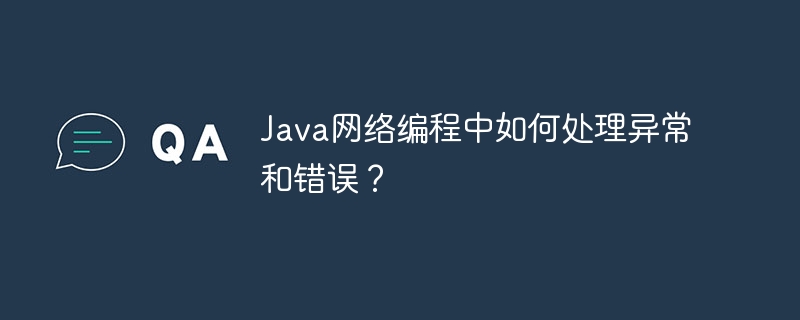Home >Java >javaTutorial >How to handle exceptions and errors in Java network programming?
How to handle exceptions and errors in Java network programming?
- WBOYWBOYWBOYWBOYWBOYWBOYWBOYWBOYWBOYWBOYWBOYWBOYWBOriginal
- 2024-04-15 17:30:02988browse
In Java network programming, exception and error handling are crucial. Exceptions allow recovery from failure, while errors usually represent unrecoverable failures. Exception handling best practices include using try-catch blocks, catching specific exceptions, providing meaningful error messages, logging exceptions, and rethrowing exceptions. Error handling best practices include detecting errors, logging errors, and closing resources. These practices help develop stable and reliable Java network applications.

Exception and error handling in Java network programming
In Java network programming, exception and error handling are crucial. If these issues are not handled correctly, it can lead to application instability or even crashes. This article will explore the best practices for handling exceptions and errors in Java network programming and demonstrate how to apply these practices through practical cases.
Exception vs. Error
In Java, exceptions and errors are different concepts:
- Exception is an event from which the application can recover from failure. They are usually caused by logic errors in the code or runtime issues such as lost network connectivity.
- Errors are events in which the application cannot recover from failure. They are usually caused by system resource exhaustion or other low-level issues such as insufficient memory.
Best Practices for Exception Handling
When handling exceptions in Java network programming, follow these best practices:
-
Use try-catch blocks: Use
tryandcatchblocks around blocks of code where exceptions may occur. Caught exceptions should be stored in objects ofExceptionor its subclasses. -
Handling specific exceptions: Avoid using generic
Exceptioncatch blocks. Instead, create specificcatchblocks for specific exceptions. - Provide meaningful error messages: Ensure that caught exceptions contain meaningful error messages to make it easier to debug problems.
- Logging exceptions: Log captured exceptions to a log file for auditing and troubleshooting.
- Rethrow Exceptions: In some cases, it may be necessary to rethrow a caught exception so that the code that called the method can handle it.
Best Practices for Error Handling
Although errors typically indicate an unrecoverable failure of the application, there are some best practices that can help manage errors:
-
Detecting errors: Use the
Errorclass provided in Java to detect errors. - Log Errors: Log captured errors to a log file for auditing and troubleshooting purposes.
- Close Resources: In the event of an error, ensure that all open resources (such as network connections and files) are released.
Practical Case
Consider the following code snippet, which reads data using a socket:
import java.io.IOException;
import java.net.Socket;
public class SocketReader {
public static void main(String[] args) {
try (Socket socket = new Socket("example.com", 80)) {
// 读取数据
} catch (IOException e) {
// 处理网络相关异常
} catch (Exception e) {
// 处理通用异常
}
}
}In this example, # The ##try-catch block is used to catch and handle network-related exceptions (IOException). Generic exceptions (Exception) are then caught to handle any other unexpected errors.
The above is the detailed content of How to handle exceptions and errors in Java network programming?. For more information, please follow other related articles on the PHP Chinese website!

